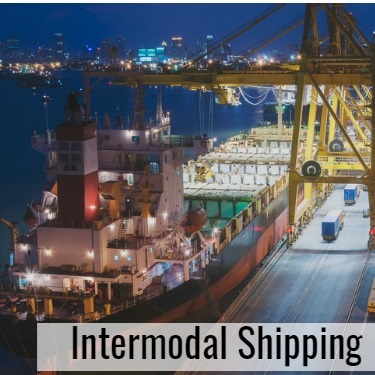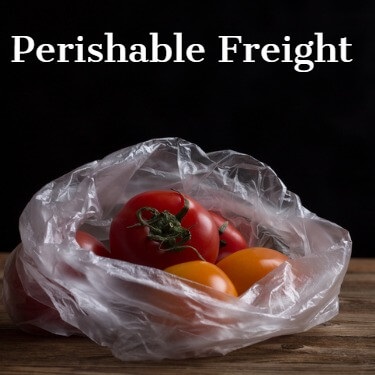Getting lost in the complicated world of freight shipping terms is common for industry veterans and newbies alike. There’s no shortage of necessary terms to be familiar with. Since new ones are added regularly, it can be difficult to keep track of them all.
In order to stay up to date with the latest freight and logistics lingo, we’ve compiled a comprehensive list for you. Listed below are some common and not so common freight terms that you need to know.
Accessorial Charges- Additional costs not included in the standard rate of freight transportation. These can include added services that were arranged with the initial transportation like liftgate service, residential delivery, and limited access. Unforeseen details like detention, redelivery, and reclassification are other examples. These are sometimes called assessorial charges.
Air Freight- Products and goods that are transported via aircraft. These goods can be placed in a dedicated cargo aircraft or in available space within a passenger plane. Also known as air cargo.
Arrival Notice- A notification sent to the consignee and other required parties to inform that a shipment has arrived. These are typically used for international shipments that arrive via air or ocean freight. The notice is typically provided via e-mail and is seen as a courtesy for importers.
Backhaul- A return route back to the originating shipping point. For example, if a carrier takes a load from Miami to Chicago, the trip back from Chicago to Miami would be considered the backhaul. Backhaul often refers to the cargo that’s hauled on the return trip as well.
BOL (Bill of Lading)- A legal document that’s required for freight shipments.
The following details are included on a Bill of Lading:
Blind Shipment- A freight shipment in which the shipper or receiver is not disclosed to the other party.
Blind shipments are typically used in two common scenarios:
Shipments can also be double blind when neither the shipper or receiver is exposed. In this situation, only the third party has knowledge of both.
Bulk Cargo- Goods that are shipped freely within the cargo area of a vehicle. Raw materials like sand, fertilizer, grains, and some liquids are often shipped as bulk cargo. Also known as bulk freight.
Carrier- The individual or company that’s responsible for the physical transportation of goods.
Cartage- Freight transportation within a short distance, typically the same city. Some carriers specialize as cartage carriers for specific geographic areas.
Classification- A designation for goods being shipped that typically determines the rate. The National Motor Freight Classification (NMFC) outlines the 18 different freight classes according to density, handling, stowability, and liability of goods.
Common Carrier- A carrier that offers their services to the general public and businesses.
Consignee- The individual or organization that is the recipient of a freight shipment. The consignee is also typically the one that pays for the shipment. Sometimes referred to as the receiver.
Consignor- Also known as the shipper, this person or organization sends the products to the receiver.

Delivery Receipt- A document that a receiver signs to confirm delivery of a freight shipment. Carriers will typically keep an electronic form of this document for their records. This is sometimes referred to as a proof of delivery.
Demurrage- A type of detention in which freight isn’t picked up by a carrier within a specified time frame. This usually leads to an additional charge to the carrier.
Detention- Refers to additional time beyond agreed upon loading and/or unloading times. When a freight shipment is arranged, the carrier establishes a specific amount of free time for loading and unloading. The amount of time will vary based on a number of factors. If the shipper or receiver exceed this time, they will typically be charged a detention fee. The detention fee is usually a per day charge.
Dispatcher- A partner that works with carriers to negotiate and book freight.
Exceptions- A disparity noted on a bill of lading when a shipment is received. Exceptions typically refer to incorrect quantity received or damage to goods.
Freight Broker- An intermediary between shippers and carriers that arranges the transportation of goods. Brokers don’t take possession of freight when serving as a broker. However, many brokers also operate as freight forwarders and carriers.
Freight Forwarder- A middleman between shippers and carriers that also takes possession of freight. Forwarders often accept large shipments and consolidate them into smaller LTL loads on behalf of a shipper. In this manner, freight forwarders also act as brokers.
FTL (Full Truckload)- A freight load that occupies the entire cargo area of a vehicle through weight and/or volume. Can also refer to a standard rate that carriers offer. LTL shippers will sometimes opt for FTL if the price is comparable since Full Truckload shipments typically arrive quicker.
Lots of freight moves from the Lone Star State. Learn more about deep water ports in Texas.
Gross Weight- Refers to the total weight of a truck including the freight. Can also refer to the total weight of a freight shipment.
Interline- A type of freight shipment in which the freight is handled by two or more carriers during the shipment. Some companies specialize in interline freight.

Intermodal Shipping- A type of shipping that involves multiple methods of transportation.
Transportation modes include:
Also known as multimodal transportation.
LTL (Less Than Truckload)- A service and rate that carriers provide to shippers with freight that won’t fill an entire truck. Cheaper than FTL rates, but freight is handled more frequently. LTL freight generally arrives later since trucks have to make more stops.
Lift Gate- A piece of equipment that can be placed on the back of a trailer that raises and lowers goods between the ground and the trailer. Many carriers offer this as a service and charge an additional fee when needed.
Limited Access- An origin or destination point that isn’t easily accessible. Most carriers will add an accessorial charge for limited access locations.
Examples of limited access locations include:
MSDS (Material Safety Data Sheet)- A document that accompanies hazardous materials when being shipped. The document outlines the nature of the hazardous material(s), risks involved, how it should be handled, and more. An MSDS is required when shipping hazardous materials.
Nested- A method of stacking freight so that one item is packed within another item. This approach is used to utilize additional cargo space.
NOI (Not Otherwise Indicated)- A designation used to identify freight that doesn’t have a freight classification. This classification should only be used when it’s confirmed that no other classification is available. If this is found to be incorrect, freight faces possible reclassifications and/or reweighs.
Origin Point- The location that a freight shipment is first picked up.
Oversized/Overlength- Terms used to describe non-standard sized items that take up more room than a typical pallet. Nearly all carriers charge an accessorial for these items.
POA (Power of Attorney)- A legal document that a shipper agrees to that gives authority to freight forwarders to manage and handle their shipments.

Perishable Freight- Freight that will decay/deteriorate over time. Perishable freight often requires temperature-controlled vehicles. It is often shipped at a quicker pace to ensure freshness upon arriving as well.
PRO Number- Along with a SCAC code, this number is unique to each freight shipment and allows parties to track shipments. If a shipper has multiple pallets being shipped to the same destination, the same PRO number is used on each pallet.
Reclassification- An accessorial charge that’s applied to a shipment when a shipper incorrectly identifies the freight class of their goods. Carriers often conduct inspections of the goods being shipped to ensure they are accurately charging for their service.
Redelivery- An accessorial charge tacked onto a shipment when a carrier is unable to deliver a shipment as scheduled and must redeliver it. Redelivery is one of the most costly accessorials.
Reweigh- An accessorial added to the cost of a shipment when the weight of a shipment is less than originally provided. Similar to reclassification.
SCAC (Standard Carrier Alpha Code)- A unique two- to four-letter code provided by the NMFTA that identifies transportation companies.
Tariff-
TONU (Truck Ordered Not Used)- A charge applied to a shipper for a canceled shipment. Typically, carriers will have a time period in which orders can be cancelled without penalty. If a shipper cancels an order after this time, they will be charged a TONU.
Volume Rate- A discounted rate that carriers may apply to LTL shipments. The discount is usually based on the number of pallets being shipped or the total weight of goods.
Those are the freight terms that we feel are essential to operational success. If you have any logistics or truckload shipping related questions or needs such as freight shipping in California, please reach out to us. We have over 30 years of logistics and trucking experience that we can put to work for your freight shipping needs across the USA.
R+L Global Logistics
315 NE 14th St., Ocala, FL 34470